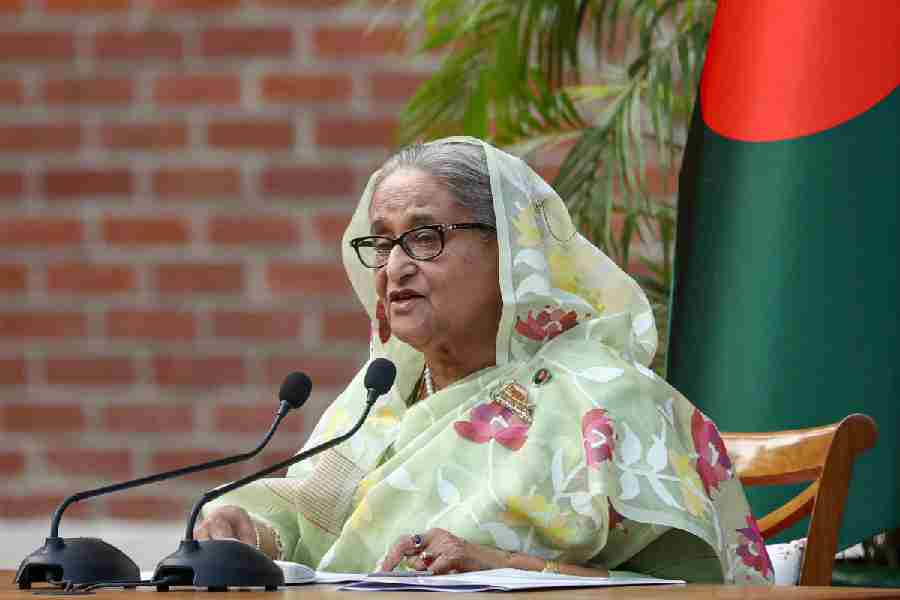The Supreme Court of Bangladesh on Sunday cut the job reservation for muktijodhhas’ kin to 5 per cent from 30, gladdening the embattled Sheikh Hasina government after days of tumultuous anti-quota protests that witnessed at least 127 deaths.
The appellate division of the court made merit the sole consideration for recruitment to 93 per cent of government jobs, while setting aside 2 per cent for ethnic minorities, transgenders and the disabled.
The government had appealed against a June 5 high court order that reinstated the 30 per cent quota for the relatives of 1971 war heroes after the Hasina government had scrapped it in 2018.
The high court verdict had triggered protests by students — who wanted the quota abolished or heavily truncated — which quickly snowballed into nationwide unrest with the Opposition Jamaat-e-Islami and the BNP wading in.
Shaken by the violence, which pushed the country to the brink of a political crisis, the government had moved the appeal on July 10.
“The Supreme Court said the high court verdict was illegal,” attorney-general Aminuddin Manik told the media on a day of relative calm.
Till late evening, there were no reports of any more deaths in clashes.
“Except for some parts in Dhaka, Narayanganj, Narsingdi and Gazipur, the situation is approaching normality in most places in the country. We expect things to be much better from tomorrow,” a source in Bangladesh said.
Amid the good news, the Hasina government received a jolt from Bengal chief minister Mamata Banerjee, who rued the deaths of students in Bangladesh and offered shelter to those in distress. The comment did not go down well with the Bangladesh government, multiple sources in Dhaka said.
Law minister Anisul Huq told the Bangladeshi media that the government welcomed the “prudent verdict” and would issue a notification on this “immediately”.
There was, however, no clarity on whether the apparent calm would last. Reports said the BNP and Jamaat were planning a bigger offensive.
In a Facebook post, BNP acting chairperson Tareq Rahman, exiled in London, urged people to unite for a “bigger movement” to bring down the Hasina government.
What the students would do next too remained shrouded in confusion amid reports of a divide among them.
BBC Bangla said some student leaders wanted the protests to continue till the government had met the other demands, such as an apology from the Prime Minister, resignation of certain senior ministers, restoration of phone lines and Internet services, and the resumption of classes on the campuses.
“The genuine students should be happy with the verdict as their demand has been met.... They have some other demands like the withdrawal of cases against students and compensation for the families of the dead,” a highly placed source in the Hasina administration said.
The source said the discussions on these demands would begin on Sunday evening or Monday morning.
“The time has come to differentiate the students from the troublemakers who want to destabilise the country. Those still pursuing violence will be dealt with strongly,” the source said.
The source skirted a question about the death toll — Bangladeshi and foreign media outlets have suggested a conservative figure of 127 — saying the numbers are yet to be collated by the government.
A senior journalist with a leading English-language newspaper, however, told this correspondent that the death count could be “between 300 and 400” as the scale of the violence was “unprecedented”.
Referring to the last few days’ violence, the journalist criticised the high-handed approach of the armed forces and the ruling Awami League’s student wing.
But the journalist, often critical of the Hasina government in the past, endorsed the government narrative and blamed the Opposition, especially Jamaat, for the crisis.
“Jamaat and its student wing had not been so active in any movement in recent memory.... They spent a lot of money, too. I’m clueless about the source of their funding,” the journalist said.
The government swung into action to counter the “misinformation campaign” that had tarnished the country’s image and brought Hasina’s role in the alleged carnage under the scanner.
In the afternoon, the government circulated a detailed list of “subversive activities”, such as vandal attacks on Mujibur Rahman’s mural in Chittagong, and arson at Bangladesh Television, Metro stations in Dhaka and scores of government offices across the country.
“Irreparable damage has been done to public properties. Do you think the students would have done such a thing?” a source in Hasina’s office said.
“After the first few days, the BNP and the Jamaat hijacked the movement. As they engaged in arson, vandalised public properties and killed innocent people, the students distanced themselves from these activities, even issuing statements to this effect.”
Bangladesh foreign minister Hasan Mahmud held a briefing for foreign mission heads in Dhaka to explain the government’s stand on the protesters’ demands and its deployment of the armed forces.
“Our PM had been sympathetic towards the student’s main demand from Day One.... The BGB (Border Guard Bangladesh) and the police were told specifically to use non-lethal means to contain the student movement till the vandals began attacking the law enforces,” another source said.
“The deployment of the army was only to help the civil administration save lives, and was made only in vulnerable areas.”
The source insisted that the forces didn’t fire a single bullet at the students.
Amid reports that a section of the armed forces was unhappy at the decision to deploy them against the students, the government released pictures of Hasina meeting top officers of the army, navy and the air force and other senior security establishment officials.
“Everything is under control. She also met senior ministers and party leaders today,” a source in the PMO said.










